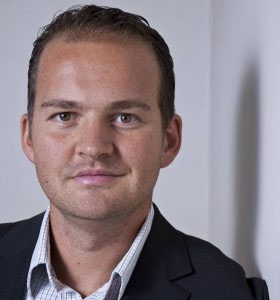
First there were low-cost airlines. Now, get ready for the era of low-cost banks, new-age financial services players than can service customers at a fraction of the cost of the incumbents by using modern, cloud-based technologies.
A slew of such institutions will be launched in the coming years in South Africa, by nimble start-ups comfortable with using modern technology in a disruptive way, by telecommunications companies wanting to tackle a new industry — and even by incumbent banks, running them in parallel with their existing, higher-cost operations, as they try to fend off the new competitors.
These are the views of Fred Baumhardt, CEO of the relatively new but fast-expanding IT company Curve Group. Baumhardt is a former chief technology officer at Microsoft South Africa and GM at VMware sub-Saharan Africa.
Curve Group, which has 120 employees, is snapping up small companies as it seeks to build bulk in the IT services market. Along with the traditional IT services — from consulting to managed outsourcing — it has developed what it calls a “bank in a box”.
“We deliver everything you need to run a full bank — every component — and we offer that as a managed cloud service,” said Baumhardt. “Within four or five months, we can deliver a full, legal bank that you don’t have to build or integrate.
“We provide the entire bank-in-a-box technology and systems, regulatory models, compliance, etc. We request you to run the call centre, do the marketing — after all, it’s your bank. We just provide the IT department backend for it. We do it at a low cost and on a shared revenue model.”
He said South Africa’s big banks have a very high cost base because of their legacy IT infrastructure. On average, it costs the banks R540/month per customer in IT/systems costs, he claimed. In the case of one large bank, systems costs come to about R750/month per customer, he added.

“It’s acceptable in America to have a US$40/month per customer cost for a technology system. In Africa, recovering R600/month in systems costs from the average customer is not feasible,” Baumhardt said.
“You have these discussions about banking the unbanked and township banking in Africa, but from the tier-one banks it’s all bullshit. It’s defeated by the technology costs they have of running a bank account.”
In South Africa, the banks have been able to do this — at least to some extent — because there is a customer base that is able to support those costs. But that’s not the case in the rest of Africa, or indeed among the unbanked or underbanked segments of the South African market, he said.
Though the big banks are “doing a good job” of constraining their IT costs, it will take at least 15 years to reduce them to levels that will allow them to compete head-on with nimbler competitors, including those in the telecoms industry who view financial services as a growth opportunity, Baumhardt said.
Curve Group is already working with local telecoms players that plan to launch financial services products that will challenge the banks, he said.
He claimed his company is able to deliver a full banking solution that costs R15/month for the underlying systems. “It’s a real-world cost of about R40/user, of which R25 is sitting in banking fees that are unavoidable, like for ATM interchange.”
What Curve has done is take the Google, Facebook, Bing and online freemium models of the Internet and applied them to banking
Besides telecoms operators, incumbent banks are talking to Curve Group about licensing its platform to launch their own low-cost banks, Baumhardt said. The launch of low-cost bank brands is inevitable, he said, and will target people in living standards measures (LSMs) that the big banks simply can’t serve today because of their cost structures.
“Digital banks, and digital challenger banks, are popping up everywhere. The mobile operators are very interested in LSMs 2-6.”
Although there are still costs involved for delivering banking, Baumhardt said Curve Group intends to make banking completely free of charges to the end user.
“What Curve has done is take the Google, Facebook, Bing and online freemium models of the Internet and applied them to banking,” he said. “We give you banking for free and we monetise 19 different revenue streams around banking that are invisible to the user.”
For example, through an online marketplace, which is integrated with logistics and fulfilment firms, lower LSM customers can be monetised, making it not only possible to offer free banking, but to do so profitably, Baumhardt said.
“We have built a completely free e-commerce platform linked to your bank account. You can run an e-store and an online shop powered by your bank account,” he said. “The bank takes 5% of your revenue flow. That’s cheap given that the average cost of running an e-commerce platform is 9-11%,” he said. Escrow ensures security of transactions.
The platform also facilitates real-time loans, with 6% of the profit going to the lender, along with other services.
Our approach has been totally different as to how to do a start-up in Africa
Curve Group was founded just eight months ago and has grown quickly through a series of acquisitions. It has an office in the UK, and three in South Africa — in Johannesburg, Cape Town and Meyerton (to serve the Vaal Triangle).
It funds development of its banking solution, which it white-labels, through a traditional IT services business called Curved Technology.
Baumhardt claims Curve Group has R2bn of business in the pipeline and zero debt on its balance sheet. “Our approach has been totally different as to how to do a start-up in Africa,” he said. It has acquired companies mainly through equity rather than cash.
“Our IT services arm is now 60 people. The profit from there goes to paying for the Cape Town-based development operations. The only purpose of the IT services business is to generate sufficient profit so we don’t need external investment. That’s how we have cut out Series A funding and external investors. We decided to build a cash cow first, to fund our engineering and development capability, that will build a US$1bn business in future.” — © 2017 NewsCentral Media




